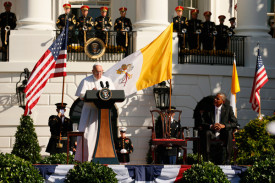By Christopher White

Pope Francis and Patriarch Bartholomew’s joint message for the World Day of Prayer for the Care of Creation comes just three months after President Donald Trump announced that the United States would withdraw from Paris Climate Agreement, and some experts suspect the two developments may be related.
Earlier this week, Francis said he and Bartholomew are inviting everyone “to take an attitude of respect and responsibility towards creation,” though the statement concludes with a direct plea to world leaders.
“We urgently appeal to those in positions of social and economic, as well as political and cultural, responsibility to hear the cry of the earth and to attend to the needs of the marginalized, but above all to respond to the plea of millions and support the consensus of the world for the healing of our wounded creation,” they wrote.
In an interview with The Tablet, Dan Misleh, executive director of the Catholic Climate Covenant, said he believes this could be an effort to get the attention of the current administration.
“Look, there was a consensus in Paris that the world needs to act on the issue of climate change,” said Misleh.
The Paris Climate Agreement was a landmark consensus reached in December 2015 by 196 countries to cut greenhouse gas emissions.
“The United States, as the leading global economic and political power, needs to be part of that, so I’m sure that the pope and the patriarch are saying. Let’s get back on the bandwagon here,” he said.
Christiana Zenner Peppard, associate professor of theology, science, and ethics at Fordham University, described the statement as both “steeped in tradition and yet fiercely contemporary.”
While the statement is a joint call to prayer, it does not end there.
“For the present moment, it seems the most important theme there is solidarity – global solidarity,” Peppard said.
“This document identifies climate change by name, twice, without qualification,” she added. “This is surely a noteworthy feature for two religious leaders who apparently take climate science- and the implications for social ethics – far more seriously than does the executive branch of the White House.”
In a commentary for the Vatican newspaper, Orthodox Archdeacon John Chryssavgis, an adviser to Bartholomew on the environment, also speculated that the joint statement may have been informed by Trump’s decision to withdraw from the Paris climate change agreement.
“I have to wonder whether the pope and the patriarch have in mind the short-sightedness and narrow-mindedness of the Trump administration,” Chryssavgis wrote, “that ill-advisedly withdrew from the Paris Agreement and irresponsibly disbanded a federal advisory committee on climate change.”
Father Christopher Bender, Chair of the Steering Committee of the Orthodox Fellowship of the Transfiguration, which focuses on care of creation, agreed with Misleh and Peppard.
The joint declaration “stands as a bold rebuke to the spirit of denial and indifference with regard to the threat of environmental destruction, which characterizes our times in this country,” he said.
“In some ways, the Eastern Orthodox community is ahead of the Roman Catholic Church on these issues,” said Misleh. “Patriarch Bartholomew has made this a central part of his work for some time now.”
Ricardo Simmonds, an environmental policy advisor for the United States Conference of Catholic Bishops, emphasized the magnitude of a joint statement between the Catholic and Orthodox churches.
“This statement is very significant, as joint statements like this are not that common,” he explained.
“It’s a very clear appeal for solidarity and unity, especially among Christians,” he said, and “sets an example for ecumenical collaboration.”
Bill Patenau, a co-founder the Global Catholic Climate Movement, added the statement offers both pastoral and practical wisdom.
“I think it’s a masterful overview of salvation history in regards to the most important, the most dramatic consequence of human sin that this generation has ever seen, and that’s the destruction that we’re bringing about of our life support systems that God gave us for humanity to survive,” said Patenau.
“One thing that I would stress, sometimes the environmental movement has been too focused on … global activism, education, websites, programs,” he said. “What Pope Francis and the Patriarch said is that all of that is in vain unless we root it in prayer and are close to God.”
Attention to environmental issues has been a reoccurring theme for Pope Francis. Since the release of Laudato si’, his landmark environmental encyclical, some conservative U.S. Catholics have questioned his prioritization of this issue.
“What’s happening with Laudato si’ and now this statement…is that we’re reminded that these divides are not helpful,” said Patenau.
“We can be both environmentalists and we can be on the front lines in front of abortion clinics, and we can be helping immigrants and we can be helping the poor, and on it goes,” he said.
“We need to recapture that, and embrace it, because that’s what’s going to unite us and make us strong,” he concluded.
